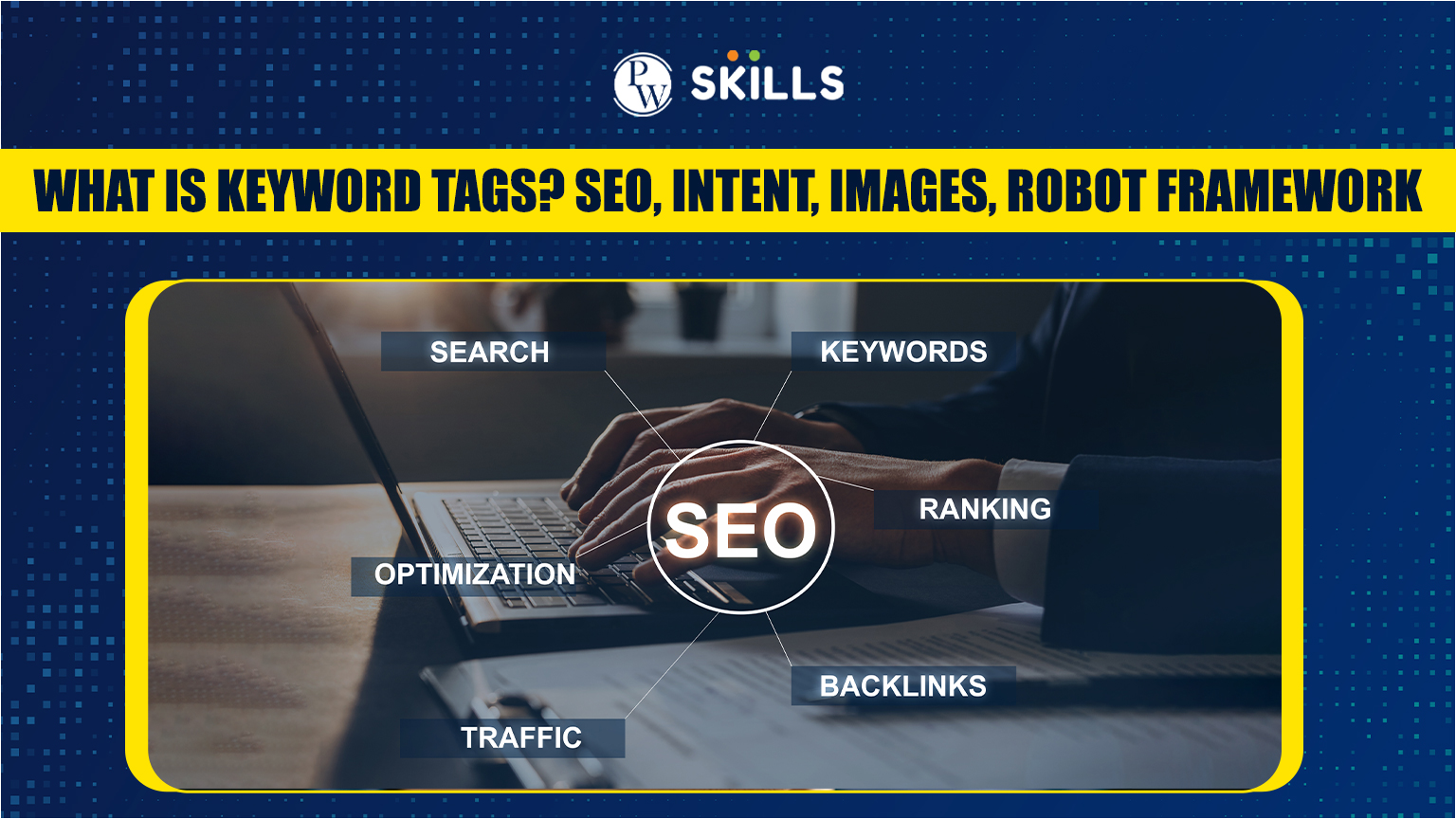Keyword tags are integral elements in the digital landscape that help categorize and optimize content for better visibility and relevance. These tags serve various purposes across different domains, enhancing user experience and searchability.
In the context of SEO, keyword tags play a pivotal role in signalling to search engines what topics a webpage covers, thus improving its ranking in search results. Intent tags help marketers understand the underlying motivations of users’ searches, allowing for more targeted and effective content strategies. For images, keyword tags improve discoverability, ensuring that visual content can be easily found and accessed. Lastly, in frameworks like Robot Framework, keyword tags facilitate the organization and execution of test cases, making automated testing more efficient.
What is Keyword Tags?
Keyword tags are essential components in the realm of digital content, serving as identifiers that enhance organization, searchability, and relevance. They are used across various platforms and applications, from search engine optimization (SEO) to testing frameworks. Understanding different types of keyword tags—such as SEO tags, intent tags, image tags, and those used in frameworks like Robot Framework—can significantly improve content strategy and user experience.
In SEO, keyword tags help search engines understand the content of a webpage, improving visibility and ranking. Intent tags categorize keywords based on user intent, aiding in targeted marketing and content creation. Image tags enhance the discoverability and accessibility of visual content. In the context of testing frameworks like Robot Framework, keyword tags help organize and execute test cases effectively.
Also Check: What Is SEO Meta Title And Description?
Why Should I Use Meta Keywords?
While the meta keywords tag is largely considered obsolete for Google SEO and no longer influences search rankings, there are still some contexts where it might be useful. For instance, certain smaller search engines and internal site search functionalities may still reference the meta keywords tag, albeit infrequently. Additionally, using meta keywords can serve as a simple organizational tool for content creators, helping to clarify the main topics of a page during the development process.
However, it is important to note that any potential benefits are minimal compared to other SEO practices. Prioritizing high-quality content, effective keyword research and a robust backlink strategy will yield far greater results in improving visibility and engagement. Ultimately, while including meta keywords won’t hurt your SEO, it should not be a focus of your optimization efforts.
How important is the meta Keywords tag in SEO for Google?
The meta keywords tag is no longer relevant for Google search engine optimization, a point confirmed by Matt Cutts, a key figure in Google’s early engineering team, in 2009. He stated that “Google does not use the ‘keywords’ meta tag in web rankings.”
- Lack of Reliability: The meta keywords tag has proven to be an unreliable source of information for search engines. Unlike other on-page elements, such as title tags and meta descriptions, which are more closely tied to the actual content of a webpage, the keyword tag can be easily manipulated. Webmasters could list irrelevant or misleading keywords that do not represent the true content of the page. This discrepancy can lead to poor user experiences, as users may be directed to pages that do not meet their search intent, ultimately diminishing the quality of search results.
- Keyword Stuffing: The misuse of the meta keywords tag became widespread as SEO professionals sought to gain an unfair advantage in search rankings. Many resorted to “keyword stuffing,” a practice where an excessive number of keywords were crammed into the tag in hopes of improving visibility. This tactic not only diluted the effectiveness of the tag but also contributed to a lower overall quality of search results. As a response, Google began to disregard the meta keywords tag altogether, focusing instead on more sophisticated algorithms that assess content relevance and quality based on user engagement and other factors.
- Algorithm Exclusion: Google’s ranking algorithms have evolved significantly over the years, incorporating complex factors that evaluate the relevance and authority of web content. The decision to exclude the meta keywords tag from these algorithms was a strategic move to enhance the integrity of search results. By not considering this tag, Google encourages webmasters to focus on creating valuable content that genuinely addresses user queries. Instead of relying on outdated tactics, SEO professionals are now incentivized to invest time in optimizing on-page elements, improving site speed, and building quality backlinks—factors that truly impact search rankings.
Understanding Keyword Tags in Digital Content
Keyword tags are essential tools for organizing, optimizing, and enhancing the discoverability of content across various digital platforms. They serve multiple purposes, from improving search engine optimization (SEO) to enhancing user experience. Below is an in-depth look at different types of keyword tags and their significance:
1. Robot Framework Keyword Tags
The keyword tags robot framework is a versatile, open-source automation framework used extensively for acceptance testing and robotic process automation (RPA). Within this framework, keyword tags are utilized to categorize and manage keywords associated with test cases.
Importance:
- Organization: Tags provide a structured way to categorize test cases, making it easier for testers to navigate through extensive test suites. This organization is particularly beneficial in large projects where multiple test cases are involved.
- Filtering: Users can filter test cases based on specific tags, allowing them to execute only relevant tests. This feature is especially useful during regression testing or when focusing on particular functionalities.
- Reporting: Tags enhance reporting capabilities by enabling users to generate detailed reports based on specific categories. This can help stakeholders understand test coverage and identify areas needing attention.
2. Keyword Tags for Images
In keyword tags images serve as metadata that describes the content and context of an image. These tags are commonly used in HTML and content management systems (CMS) to improve image discoverability.
Importance:
- SEO Optimization: Properly keyword tags images can significantly enhance their searchability and visibility in image search results. Search engines like Google use these tags to understand the content of images, which can lead to increased traffic to websites.
- Accessibility: Keyword tags, often in the form of alt text, provide context for visually impaired users who rely on screen readers. This practice not only improves accessibility but also aligns with best practices for inclusive design.
- Organization: Keyword tag images help in categorizing and managing image libraries effectively, making it easier for content creators to find and utilize images as needed. This organization is vital for maintaining a streamlined workflow in content production.
Also Check: What is Online Internet Marketing
3. Keyword Meta Tags
Keyword meta tags are HTML elements that provide search engines with information about the content of a webpage. While their significance has diminished in recent years, they still have a role in certain SEO strategies.
Importance:
- SEO Signals: Although their influence on rankings has decreased, keyword meta tags can still offer search engines hints about the content of a page. They can serve as a supplementary tool in a broader SEO strategy.
- Relevance: By including relevant keywords, these tags can help ensure that content aligns with targeted search queries. However, it is crucial to use them judiciously to avoid keyword stuffing, which can lead to penalties from search engines.
- Historical Context: While many SEO experts no longer prioritize meta keywords, they can still provide historical context for some websites, especially those that have been around for a long time and have accumulated various optimization practices over the years.
4. Keyword Intent Tags
Keyword intent tags categorize keywords based on the underlying intent of the user behind their search queries. These tags are vital for content marketing and SEO strategies, as they help businesses tailor their content to better meet user needs.
Importance:
- User Understanding: By categorizing keywords into types such as informational, transactional, and navigational, marketers can gain insights into what users are looking for. This understanding is essential for crafting content that resonates with the audience.
- Content Strategy: Identifying user intent allows businesses to create targeted content that aligns with user needs, improving engagement and conversion rates. For instance, content aimed at transactional intent may focus on product comparisons, while informational content may provide how-to guides.
- Targeted Advertising: Intent tags can guide advertising campaigns by ensuring that messages resonate with the audience’s current state of mind. By aligning ads with user intent, businesses can increase the effectiveness of their marketing efforts and achieve better return on investment (ROI)
Incorporating Meta Keywords in Your Content
Incorporating meta keywords into your content strategy is essential for improving search engine visibility and attracting the right audience. By carefully selecting and integrating relevant keywords, you can enhance your site’s relevance and performance in search results. Here are some effective strategies to consider:
1. Common Misspellings
Incorporating common misspellings of your primary keywords can be an effective strategy for capturing additional traffic. When users mistype their search queries, they may still be looking for your content. By adding these variations to your meta tags, you enhance the relevance of your page while keeping your main content clear and focused.
- Implementation Tips:
- Research Common Mistakes: Use keyword research tools or Google’s autocomplete feature to identify frequent misspellings related to your keywords.
- Prioritize Relevance: Only include misspellings that are closely related to your main keyword to maintain focus.
- Example: If your primary keyword is “running shoes,” consider including misspellings like “runnning shoes,” “runing shoes,” or even phonetic variations like “runnin shoes.”
- Monitoring Performance: Use analytics to track the performance of these misspellings. If certain misspellings drive significant traffic, consider emphasizing them in your overall SEO strategy.
2. Long-Tail Keywords
Utilizing long-tail keywords is crucial for effectively targeting specific niches. These phrases, typically consisting of three or more words, allow you to connect with users with specific queries or needs.
Benefits:
-
- Lower Competition: Long-tail keywords usually have less competition than more general terms, making ranking higher in search results easier.
- Higher Conversion Rates: Users searching for detailed phrases are often closer to making a purchase decision, leading to increased conversion rates.
Implementation Tips:
-
-
- Keyword Research: Use tools like SEMrush or Ahrefs to find relevant long-tail keywords in your niche.
- Content Optimization: Incorporate these phrases naturally into your content, headings, and meta descriptions for improved SEO impact.
-
- Example: Instead of simply using “shoes,” consider a phrase like “best running shoes for flat feet” or “affordable trail running shoes.”
- Content Creation: Create dedicated content around long-tail keywords, such as blog posts or guides, to further establish your authority and attract targeted traffic.
Also Read: Youtube SEO Keywords
3. Real Searches
Analyzing actual search terms that have led users to your page is vital for effective keyword integration. Understanding the language your audience uses can significantly enhance your content strategy.
- Steps:
- Review Analytics: Utilize tools like Google Analytics or Search Console to find keywords that have historically driven traffic to your site. Pay attention to both organic and paid search data.
- Identify Trends: Look for patterns in the search terms—what topics or products are users interested in? This can inform future content and keyword strategies.
- Incorporate Findings: Once you have identified valuable search terms, integrate these keywords into your meta tags, headings, and body content. Ensure that they fit naturally to maintain quality.
- Outcome: This data-driven approach not only aligns your keywords with user behaviour but also enhances the relevance of your content. By focusing on real searches, you can increase your chances of discovery and engagement.
- Continuous Improvement: Regularly update your keyword strategy based on analytics and changing trends to keep your content fresh and relevant.
Learn Digital Marketing with PW Skills
If you are interested in making a shining career in Digital Marketing or a relevant position then enroll in PW Skills Digital marketing Course and prepare yourself for a wide range of opportunities in digital marketing.
Master advanced concepts and tools of Digital Marketing with the power of Artificial intelligence in this 6 month upskilling program. Get certified and prepare for your interviews only at pwskills.com
Keyword Tags FAQs
What Are Keyword Meta Tags?
Keyword meta tags are a specific type of meta tag found in the HTML code of a webpage. They help indicate to search engines what the main topics of the page are.
Do Tags Increase SEO?
Yes, using tags can improve your SEO. When you organize your content with tags, it makes it easier for visitors to find what they need, encouraging them to spend more time on your site. This increased engagement signals to Google that your content is relevant and valuable.
How Many Keywords Can You Use in Tags?
There is no official limit on the number of meta keywords you can include. Different search engines have their own guidelines, but it’s generally a good practice to use fewer than 10% of the total words on a page for your keywords.






